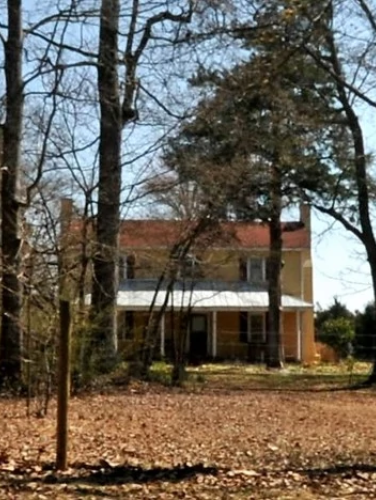
Gluyas House
(ca. 1865)
For three generations, local farmer and politician Thomas Gluyas and his family resided in the Gluyas House in Mecklenburg County’s Long Creek community.
7314 Mt Holly-Huntersville Rd, Charlotte, NC 28216
Located in the Long Creek community, the Gluyas House evidences the burgeoning cotton economy that flourished in Mecklenburg County during the so-called New South era of the late nineteenth century. With the establishment of the Charlotte Cotton Mills in 1881, Charlotte and Mecklenburg County began to experience rapid industrial growth, especially in textiles. Mecklenburg farmers found ready markets for cotton, both locally and regionally. Those like Thomas Gluyas (1826-1912), who had the ability and resources to take advantage of this expanding economic opportunity, prospered.
Property Quick Links
The second son of John Gluyas (1796-1858) – an experienced mining engineer from Cornwall, England – and Mary Bennetts Gluyas (1801-1876), Thomas Gluyas accompanied his parents to the U.S. in 1837 as an eleven-year-old boy. In 1838 the family moved to Mecklenburg County, where John became an official of the Mecklenburg Gold Mining Company and oversaw the steam-powered machinery at the Capp’s Hill Gold Mine off Beatties Ford Road. Thomas moved to Jamestown, North Carolina, in the 1840s to apprentice with a gunsmith. There he met and married Latitia Beeson Gluyas (1831-1909). The couple returned to Mecklenburg County in about 1850 to establish their residence on his father’s farm. In 1860, Thomas purchased a 220-acre tract of land on what is now Mount Holly-Huntersville Road to build the Gluyas House and begin his agricultural operations that ultimately expanded to some 440 acres. Following the Civil War, Thomas primarily cultivated corn and cotton, hiring several Black tenant farmers to live and work on his farm. He also continued his trade as a gunsmith. Thomas became a prominent figure in the public affairs of Mecklenburg County in the late nineteenth and early twentieth centuries. In addition to managing his farm, Thomas served as a captain in a local militia company during the Civil War, was a founding member of St. Mark’s Episcopal Church (where he and Latitia were later buried), and was elected to the Mecklenburg County Board of Commissioners and the North Carolina Legislature.
Thomas and Latitia raised four daughters and one son. Their son John Oliver Gluyas (1863-1912) and his wife Sallie inherited the Gluyas House and some 85 acres following his father’s death but died unexpectedly just ten days later. That left Sallie to oversee the family farm while raising the couple’s ten children. At least three of Sallie’s daughters continued to live with their mother well into adulthood. Three generations of the Gluyas family lived in the Gluyas House until 1995 when Alice Josephine Gluyas, John and Sallie’s last surviving child, passed away.

